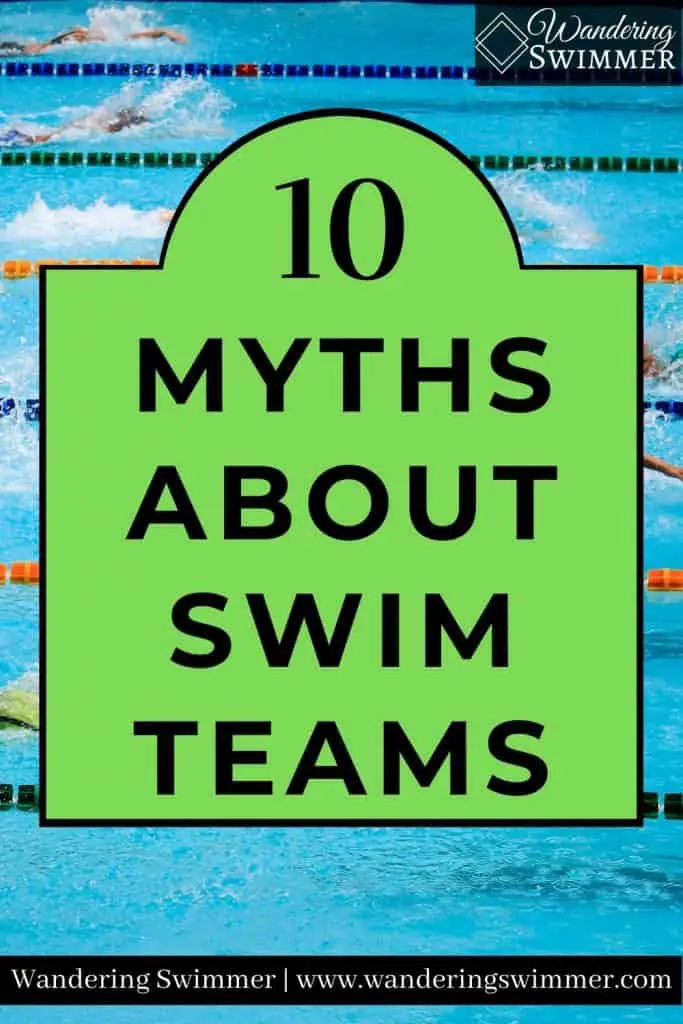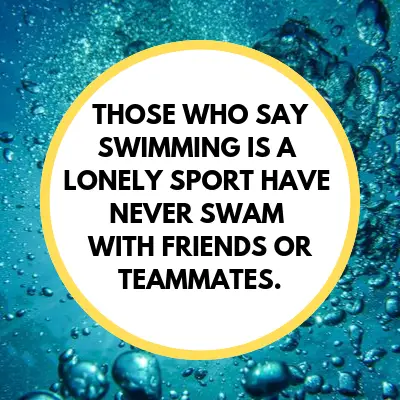Swim teams can be confusing for those new to the sport. And as a result, some swim team myths tend to mislead some people in various ways.
Some of these myths about swim teams though might keep some individuals from joining a team. Even though swim teams can provide various benefits and can create lifelong friendships.
More Content for You: Swimming Secrets: What Really Happens at Swim Practice
Think you know the answer to some of these myths that surround swim teams? Let’s debunk these 10 common swim team myths.
Disclosure: This post may contain affiliate links, meaning I earn a small commission at no cost to you if you purchase something through one of my links. As an Amazon Associate, I earn from qualifying purchases. Please check out my disclosure page for more information.

- 1. Have to Join a Swim Team at a Young Age
- 2. You Have to Stop Competitive Swimming at a Certain Age
- 3. The ‘Swimmer Body’ Myth
- 4. Have to be an Expert to Join a Swim Team
- 5. Only Year-Round Club Swimmers Can Swim on College Teams
- 6. Swimmers Don’t Sweat (And Hydration is Optional)
- 7. Can’t Train or Compete During Your Period
- 8. When You’re on a Swim Team, You Can Eat Whatever You Want
- 9. Waiting to get in the Water After Eating
- 10. Being on a Swim Team Saves You From Drowning
- BONUS: 11. Swim Teams Aren’t Fun
- Bonus Content:
- Want to Improve at the Pool?
1. Have to Join a Swim Team at a Young Age
One big myth when it comes to swim teams is that you can only join a swim team at a young age. This myth seems to stretch across all sports. And while I can’t speak to the other sports, I can speak about swimming.
While starting young has its pros and cons, no rule or guideline says you can’t join a swim team as you get older.
Related article: 5 Things to Know Before Joining a Swim Team
Want proof? I didn’t join a swim team until I started high school. And Masters Swimming has grown adults joining swim teams for the first time.
That said, don’t let age stop you from joining a swim team. Just because you didn’t start swimming as young as others did doesn’t mean you lost that chance.
2. You Have to Stop Competitive Swimming at a Certain Age
On the subject of age and swimming.
Another myth that even swimmers seem to believe is that you have to stop competitive swimming by a certain age. Let’s set this to facts, shall we? 🙂
Much like how swimming doesn’t have an age to join a team or even start swimming, there isn’t a set age that you need to quit swimming.
While the typical age seen at competition ranges from 8-25, it’s not the only age that you can compete at. Many swimmers still compete well past what’s considered the ‘prime age’ of competition, but they don’t let that stop them!
Just because someone finishes their college or even high school career doesn’t mean they should stop swimming. Swimming is an amazing, full-body workout and is low impact so that any age can enjoy the sport.
Even if you transition from competitive swimming to leisure/lap swimming. Age shouldn’t dictate when you want to stop swimming 🙂
Masters Swimming again is another good example of individuals bucking the norm of only competing or swimming in their prime age. Swimming is ageless and the water doesn’t judge you based on your age!
Related article: 14 Reasons to Join Masters Swimming
3. The ‘Swimmer Body’ Myth
Everyone seems to fall victim to this myth, especially swimmers. It’s the belief that you need to have a certain body type to be a swimmer. Especially a competitive swimmer.
The truth of the matter is that you don’t need a certain body type for competitive swimming. And anyone who tells you otherwise is lying and being harmful.
Another kernel of truth is that each body type works in different ways. Shorter swimmers tend to turnover faster. While some swimmers build larger and stronger muscles, which can lead to a larger frame.
The main take away is that you learn what works best for your body and train that way.
It’ll be hard. Not because it’s impossible, but because people tend to be hurtful and disrespectful to people they see as ‘different’.
And I won’t stand here and say to go after something that makes you uncomfortable or upset. Your safety, well-being, and comfort should come first.
But if you’ve never considered a swim team because you think you don’t have the ‘swimmer’s body’, I encourage you to give it another consideration 🙂
4. Have to be an Expert to Join a Swim Team
This is a yes and no myth.
It’s half a myth because most swim teams have various levels within the team for swimmers. These can range from novice levels up to elite.
For example, a high school team will have junior varsity and varsity. And a club team can have levels such as bronze, silver, and gold groups.
More Content for You: New Year’s Resolutions for Swimmers
Based on your swimming level and ability, you can swim with the group that best fits your skills. From there, you can work on becoming an expert and moving up through the various levels. No swimmer started as an expert. Even Olympians started in a novice type group!
The point of a swim team is to better yourself. If you were already an expert and knew everything, you wouldn’t need a team.
However. This myth does have some truth behind it.
In that, you should know how to swim before considering a swim team. Most swim teams require that incoming swimmers have a basic level of swimming skills. They’ll test these skills through tryouts to determine the best level for you.
Related article: 10 Tips to Prepare for Swim Team Tryouts
If you can’t or don’t know how to swim, it’s probably best to connect with a swim school or program that can teach you how to swim first.
Some teams do offer in house swim lessons that feed directly into the team after certain skills are learned. See if any swim teams near you offer this as an option.
5. Only Year-Round Club Swimmers Can Swim on College Teams
Many swimmers, coaches, and families believe that only year-round club swimmers can swim on college teams.
While there’s no denying that year-round club teams can increase a swimmer’s chance of being recruited by certain colleges, it’s not a hard rule.
Hundreds of colleges have swim teams in their athletic program. And there’s a program that fits every swimmer.
More Content for You: How Much Does Competitive Swimming Cost?
Those swimmers that only swim in high school and want to swim in college might not make a Division I team. But they still have options through Division II or III, which can still provide scholarship opportunities.
This swim team myth forces many families to believe that they have to join club swimming if their child wants to succeed. Even though not all club swimmers can make it to a Division I school to swim!
6. Swimmers Don’t Sweat (And Hydration is Optional)
This is another huge myth about swimming, for both leisure/lap swimming and competitive swimming. And it’s dangerous to believe.
Swimmers do sweat in the water, just as any athlete would when practicing or competing. Just because the water conceals the sweat doesn’t mean that it’s not there.
For this reason, it’s important that when you’re swimming, you keep hydrated. Have a reusable water bottle with you whenever you’re at the pool. Especially if you’re swimming outside in the heat or sun. Or, if the water is exceedingly warm.
It might seem like the water feels good and that you’re not sweating, but I promise you are. Becoming lightheaded while you’re in the water due to dehydration is a dangerous combination.
While on the subject of staying hydrated, don’t forget to wash out your water bottles frequently. There’s a belief going around on teams that the chlorine will take care of anything contagious or dangerous.
And while the chlorinated water helps keep things sanitary, mold can still build up in the mouthpiece. Scrub out your water bottle and its various components to help prevent any mold build-up.
7. Can’t Train or Compete During Your Period
This is a huge swim team myth for those that menstruate. You can (and should) swim while you’re on your period! Menstruating is a normal body function and is nothing to be ashamed of.
And yes, you can train and compete during your period. It might be uncomfortable and you could experience some pain after your practice or race, but you shouldn’t let it hold you back.
Activities such as swimming can actually help you with cramps!
A side myth about swimming on your period is that you don’t need to use products. While it’s true that water can slow your flow down, it doesn’t stop the bleeding entirely. Especially if you’re on a heavy day.
Related articles:
If you want to swim during your period, be sure to either a tampon or menstrual cup. Never use a pad in the water!
But mainly, don’t worry or feel embarrassed. You’re not alone in this 🙂

8. When You’re on a Swim Team, You Can Eat Whatever You Want
Eh. This is a yes and no myth, too.
Because while swimming does burn hundreds of calories, it varies based on intensity, duration, and frequency.
Yes, swim teams have ‘pasta parties’ and will go out after practice to eat like crazy. Based on your team, that’s not a myth.
Competitive swimmers who train twice a day for six days a week need to eat more than the average person. Even those swimmers who train once a day will eat more than your typical lap swimmer.
But.
They still have to be smart about what they eat.
That means not eating fast food for every meal. Or eating sugary desserts all the time. There is a balance that swimmers need to find. Yes, swimmers can eat a lot of meals. And a lot during those meals.
However, those meals should be balanced with protein, carbs, and vegetables/fruits. Sugar and dessert, in quantity, are okay.
Not sure what your nutrition should look like while you’re swimming? Don’t believe this swim team myth. Talk to your doctor or a nutritionist to develop a plan that works best for you and your lifestyle.
9. Waiting to get in the Water After Eating
Much like eating whatever you want, this swimming myth comes with a clause. Mainly because it varies by person.
If you’re swimming laps or training, you should eat something before working out. Your body will need that energy to make it through your workout time without leaving you to feel like overcooked pasta.
Again, there’s a ‘but’ to this.
You have to watch what and when you’re eating. I wouldn’t recommend eating a large meal minutes before getting into the water. While you may or may not cramp up, you also run the risk of throwing up in the water.
A small snack though just before a workout, such as a banana, some pasta, or fruit, is easier for the stomach to handle.
This varies with each individual. What one person can tolerate will differ from another. I’ve known swimmers who could eat two fully loaded hot dogs about 15 minutes before a workout and have no issue. Others need more time to digest.
If you’re ever not sure, play it safe!

The same thing holds true for swim meets. You need to eat something during long meets. Otherwise, you run the risk of having a bad meet. You just need to be smart about it.
Don’t eat just before going up to your race. Or if you do, pick something extremely small that won’t upset your stomach. Likewise, don’t let yourself give in to temptation and get nachos, pizza, or whatever else they’re selling at the concession stand.
10. Being on a Swim Team Saves You From Drowning
This is not just a myth, but it’s also a dangerous myth to believe.
Knowing how to swim or being on a swim team doesn’t prevent drowning. Even the best swimmers can drown or suffer from cramps or blackouts that can lead to drowning. It’s also one of the reasons you should never swim alone, too.
Having the ability to swim or being apart of a swim team can help make you safer in the water than not knowing how to swim.
BONUS: 11. Swim Teams Aren’t Fun
Yes and no. 🙂
As someone who has spent 12+ years on a swim team, I feel as though this is a myth. Swim teams can be fun if you mesh well with the team, coach, and the program. But just because a team can be fun doesn’t mean that the work isn’t hard.

Being apart of a swim team means you have to put in some hard work along the way. And it’s not all starts and turns at every practice.
That said, swim teams aren’t for everyone. The wrong coach or team can sour the experience. And yes, some people don’t want to put in the work. When you dislike the team, practices, and you’re not seeing results, then yes, swim teams might not be fun for you.
But for those that like the sport and can find enjoyment in it even during the challenging practices, then a swim team might be fun for you!
As always, to happy swimming!
Chevron
Bonus Content:
Your Swim Team Overview: A swim team may seem simple. But it has its many quirks. Here is a brief overview of swim team basics to help you get started.
7 Things Every Swimmer Should Have: What gear do successful swimmers use that others don’t? While this can vary by swimmer, here are 7 things every swimmer should have

Want to Improve at the Pool?
Join swimmers and swim parents to receive my free newsletter and receive a free Swimming Glossary e-book as a thanks!
Every month you’ll receive tips and coaching to help you find success at the pool.